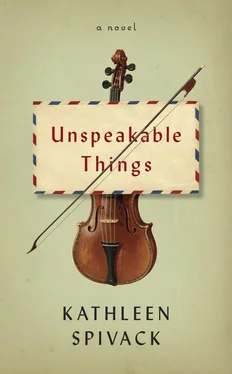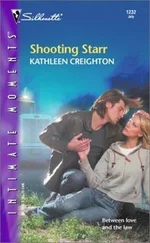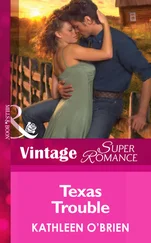The immigrants pulled their coats more tightly about their protesting bodies. The coats were worn, but the wool was strong as steel. What once had been soft was now a rigid woven fabric of determination. Though the teasing New York wind found its way into the garments, the immigrants held on to their European values. Their belief in the triumph of humanitarianism, all those examinations of ethics came into play as they attempted to find meaning in suffering. All that education, all that philosophy and music and history and culture: this was what would hold them upright now.
“Baby, I been missing you,” moaned the cheerful musicians uptown. “Oh baby, I’s so blue.” The instruments wheedled and chorused, while the smoke of nightclubs wreathed around their heads. A shaft of early-morning sunlight illuminated the smoke for a moment. “Baby, I been missing you.”
The trains ran through New York, crisscrossing with a wet, nostalgic sound. The traffic poured endlessly through the streets. Impatient, the dark horns of taxis hooted next to the horns of the great ships, swinging into and out of the harbor. And the horns of Harlem played; the music was picking up. Europe seemed far away.
But even while buses rushed through the streets, there was a war going on. America was in it, too. Too late. The immigrants bent their baffled heads and tried to find their way. They had much to tell, no one to tell it to. But for now, that didn’t matter. They tried to get on with their lives.
New York, New York, City of Light. The Great White Way, the waste of light. All that light. The immigrants sought a cool refreshment, shadow, which they knew and loved. The museums. The Public Library. The dark recesses of the smallest, poorest cafeterias. The darkened rooms, unheated, of the tenements. If they were lucky, they found work. Somewhere, in a room without light. Anywhere.
So Herbert, too, king mole of all the moles, had found his shadow space in which to operate. The Automat. The New York Public Library, a hushed, dark place where one could conduct one’s business in whispers.
Wherever he was, Herbert conducted his business. It was like an inflexible dance, which he must dance until he dropped from exhaustion. And even beyond that.
“May I have this dance?” Herbert waited and received his partners. Heads bent, their walk not a dance but a maimed shuffle, the refugees petitioned for favors. They fell at his feet; they slumped to their knees; they kissed his ring. Herbert tried to avoid, in a self-deprecating way, these attentions. The refugees looked directly into his eyes, and he saw in theirs a will that he do what they wished. He could only submit. “I am your servant,” he said, comforting them. “I am at your service.” A long, slow dance, with no lack of partners cutting in and out. “I will do what I can,” he promised again, and he did.
Herbert kept no records, no written files on his work. He relied on his memory, his good word, and the promises of others. Nothing was ever to be found in writing on anything he undertook. When he died, it would be to leave behind only a few notes on Esperanto, a few old books on chess moves, and a small heap of shiny dust, glittering like gold powder: like flakes of himself, shavings of dandruff or halo dust about his shoulders. Just a small shiny heap on the bed where he had floated, scheming.
Herbert’s partners clutched him desperately, dictating the pace and turning in one direction only, inexorably counterclockwise — that is to say, against the clock. He could not persuade them otherwise. He did not know any other steps.
But uptown, elsewhere in New York, the city throbbed with its own beat. The Two-Step, the Chicken, the Turkey, the Herky-Jerky, the Fox-Trot, the Charleston. Disjointed syncopation: new steps invented every day. The dancers, their faces like the masks of grinning animals, bobbed and pouted in their atavistic rituals. Forgetfulness was the name of the dance in New York, waiting to celebrate itself in all its brash optimism. The Yanks were here; the Yanks would do the job. Watch out, Hitler! Watch out, world!
The trumpets blared in their loud promise. Nothing was subtle about New York, nothing.
The sailors, the soldiers, the girls, the coupling, the smoky blues, all cried of entitlement, an arrogance and happiness and optimism untouched by the kinds of losses the immigrants had lived with for centuries. On the stoops of tenements, old men sat uselessly, watching this strange new American race. Old women, and young ones, too, sad and dark-eyed, graven into headstones of themselves, watched with weariness, put down or picked up sewing, then put it down again, wondering. How would they survive such a harsh, bright light?
Dusk was the hardest time. When the diamond lights went on in the big jagged city, when the bluish haze of smoke and evening came down from its perch somewhere up in the sky and curled itself around the avenues, New York began to come alive. A city of night, of jazz, of sound, both comforting and inexpressibly lonely, all at the same time. Hope and despair — loss of a girl, perhaps, or of love. This was jazz.
The immigrants thought of their other losses, all of them — everything lost. For them, dusk was a time of grief, no mocking gaiety to underscore, no irony. Maria, with her grandfather and little brother, after a day at the Public Library, saw the spirit of the city about her. People were moving happily, hopefully, going somewhere. But they were going to the makeshift little room where other people’s pasts would always seem more real than any present moment she might ever choose to live.
Always the past, with its stately progression of dances. The formal waltz, partners held in a pattern of arms and posture that might have contained them all their lives had not history happened. Passions so carefully contained that the merest flicker of a shadow was seen in its most significant perspective. The sun slanting toward autumn in the garden, a glance exchanged, a pressure of hands. A knock on the door. A few discreet words—“Herr Hofrat…”—whispered. There were warnings everywhere, if one could but hear them carefully. Herbert had gotten the family out of Europe just in time. All but Michael.
He had not properly understood the whispered warnings. Never imagined they could be for him. It was David who had understood them finally, poor shabby David, made for the real world in ways the rest of the family was not. “Herr Hofrat, if you know what is good for you, you will…” Eventually, Herbert accepted.
Now he had gotten them into a dance that would never end. A strange dance in a strange city, too fast for them all. The dancers shuffled slowly, pausing to lean and gasp for breath. They would be lucky if Herbert could find jobs for them all, a place to live, papers, false if necessary. Their dance was more of a dirgelike shuffle.
Still, as long as there is life, there is the dance. Though the immigrants kept to their stately formal waltzes, their grandchildren might one day dance to the new rhythms in what would be a revival of jazz. But the first two generations had to live out their lives still in desperate partnership, not quite believing they were in a new place.
In their minds, they would be always young, turning and spinning slowly under the flicker of candles, holding one another at arm’s length, the women’s white shoulders, the gleam of flowers and eyes and hair, the crackle and gossip of a delightfully scandalized city, Vienna, bourgeois, staid, stuffy, and malicious. The Viennese Waltz — Vienna had even given its name to the form of the dance. The music gathered, the string players hummed along with their instruments, and the city rustled with the sounds of the dance. Only David, Herbert’s son, who worked as a decoder in Washington, D.C., sat outside its skirted circle, still bent over the chessboard in the garden, still trying miserably to figure it all out, decode, decipher, live up to his father’s expectations.
Читать дальше












